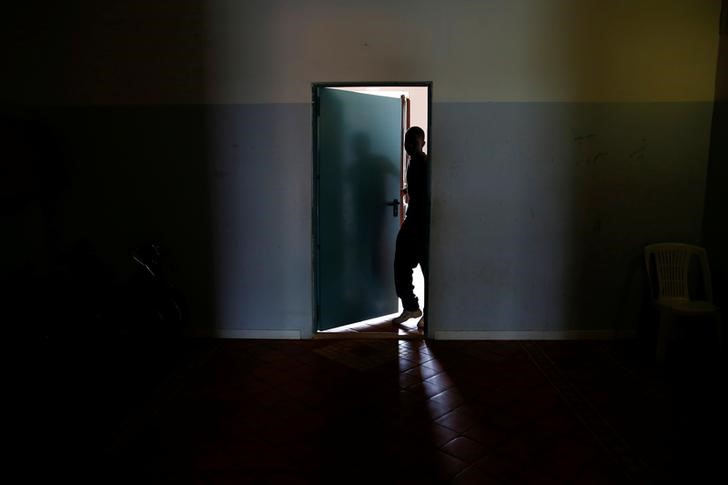By Magdalena Mis
SYRACUSE, Italy (Thomson Reuters Foundation) – Isaac, a 17 year-old from Ghana, holds back tears and looks down as he tries to describe the six months he spent in a Libyan jail where he says not a night would pass without someone dying. “There were too many people. When you tried to sleep, you couldn’t even stretch your legs,” he said, adjusting his red and gray baseball cap.
“Someone would die every night and they wouldn’t even take the dead bodies. I saw a lot of dead people put on fire.”
Isaac, who did not give his real name to protect his privacy, headed to Libya, leaving his mother and siblings behind in Ghana, after being persuaded by a man from his village to seek a better life elsewhere. He now lives with 11 other boys in a home for child migrants in the Sicilian town of Syracuse – one of thousands of unaccompanied children who have come to Italy, many with horror stories about their time in Libya, where insecurity has allowed smugglers, militias and Islamic State to operate with impunity. The U.N. children’s agency, UNICEF, has warned that lone child migrants, who are traveling to Europe in greater numbers, are at risk of rape, forced labor, beatings and death during their long, treacherous journeys. But reaching Italy does not mean an end to exploitation and even in the country’s reception centers, children are at risk, UNICEF said.
“They are object of exploitation in different ways,” Paolo Rozera, head of UNICEF Italy, told the Thomson Reuters Foundation.
“One is sexual exploitation, the other is child labor in the fields of the rural areas of Apulia, Calabria, Sicily.”
Rozera said agents in charge of hiring laborers to work in the fields of Italy’s southern regions did not care if the workers were 15, 17 or 20 years-old.
“For them it’s very important to find people that are available to work for very few euros,” he said.
“For the minors it’s an opportunity to earn some money for themselves or to send to their parents.”
WARNINGS
Lidia Grimaldi, from Saligaro, a charity which runs two homes for child migrants in Sicily, said children were keen to earn some extra cash to send home. But unaware of their rights, they were often deceived. “When you drive in the countryside you can see boys working in the fields,” Grimaldi told the Thomson Reuters Foundation.
“One of the children told us he went to work (on a farm) and received 20 euros ($23) for an entire day’s work while the normal salary is 70 euros ($79) to 80 euros ($90). We told him not to go back there because it’s exploitation.” Grimaldi said even though her team tries to protect the 24 boys staying in Saligaro’s homes, some children may still return to unscrupulous employers despite the warnings.
In the first five months of 2016, more than 7,000 unaccompanied children made the crossing from North Africa to Italy, according to UNICEF.
Of the 20,000 unaccompanied migrant children in Italy, some 5,000 have disappeared from migrant reception centers raising fears for their plight, Rozera said.
A speedier asylum process would reduce the frustration caused by long delays in processing claims, and the temptation to run away, he said.
“When you’re speaking with a 15 year-old, they don’t want to wait,” Rozera said.
“They arrive in Italy after perhaps a 2 or 3 year journey. Their only hope is their future. The Italian government is really doing a lot (but) we can do it better.”
Italy has been on the front line of Europe’s migration crisis, now in its third year, after a deal struck by the European Union with Turkey largely halted the flow of Syrians and others from Turkish territory to Greece. EU border agency Frontex said in July that about 750 people, mostly from sub-Saharan and Western Africa, were arriving in Italy each day compared with about 50 in Greece.
Back in Syracuse, Isaac’s face lights up as he talks about his new life in Europe.
“In Italy, when you’re sad they talk to you until you laugh,” he said.
“I don’t feel Ghanaian, Libyan or Italian. I don’t know where I’m from any more. But in Italy, I’m happy.” he said, adding that he dreams of becoming a professional footballer. ($1 = 0.8860 euros)
(Reporting by Magdalena Mis; Editing by Katie Nguyen.; Please credit Thomson Reuters Foundation, the charitable arm of Thomson Reuters, that covers humanitarian news, women’s rights, corruption and climate change. Visit news.trust.org)
Abused and exploited, child migrants in Italy dream of better life

By Magdalena Mis














